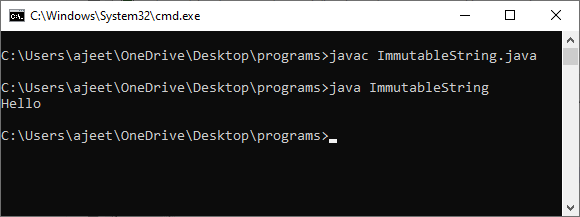Why Are Strings Immutable in Java? Enhancing Code Reliability
Why Are Strings Immutable in Java? Enhancing Code Reliability
Blog Article
What Is Immutable Strings and How It Works
In the realm of programs, understanding the principle of unalterable strings is critical for producing durable and secure applications. Immutable strings refer to strings that can not be altered after they are produced, making certain information integrity and predictability within the code. This basic principle plays a critical function in numerous shows languages and uses an one-of-a-kind method to managing data. By exploring the complexities of how immutable strings operate, one can uncover a world of advantages and opportunities that can elevate the high quality and efficiency of software application advancement.
The Fundamentals of Unalterable Strings
Unalterable strings, as a basic principle in programming, are character sequences that can not be altered as soon as they are created. This means that as soon as a string is assigned a value, that value can not be modified. In languages like Python and Java, strings are immutable objects, resulting in various effects in terms of memory management and information stability.
Among the essential advantages of immutable strings is that they provide a complacency in data adjustment. Considering that the material of an immutable string can not be modified, it ensures that the original information stays undamaged, minimizing the risk of unplanned adjustments during program execution (Why are strings immutable in Java?). This residential property also simplifies debugging procedures, as developers can rely on that as soon as a string is specified, its worth will certainly not be inadvertently changed
When a brand-new string is developed based on an existing one, rather than customizing the original string, the brand-new value is stored separately. Generally, comprehending the fundamentals of immutable strings is important for understanding programming principles and optimizing code effectiveness.
Benefits of Immutable Strings
Structure upon the security and effectiveness advantages of immutable strings, their benefits encompass improving code reliability and simplifying concurrent programming jobs. By being immutable, strings can not be customized after development, which removes the risk of unplanned modifications in the information they save. This integral immutability makes certain that once a string is developed, its worth stays consistent throughout the program's execution, lowering the possibilities of bugs caused by unexpected alterations.
Furthermore, immutable strings contribute to code dependability by making it easier to reason regarding the state of a program. Considering that strings can not be altered, designers can trust that a string will constantly hold the very same worth, streamlining debugging and upkeep initiatives. This predictability results in more steady and reputable codebases.

Application in Programs Languages
Within various programming languages, the incorporation of unalterable strings is a fundamental element that impacts how information is handled and adjusted within code structures. The application of immutable strings varies throughout various programming languages, with each language providing its own systems to sustain this concept.

In comparison, languages like C and C++ do not have integrated assistance for immutable strings. Designers in these languages have to by hand carry out immutability by implementing policies within their code site link to stop direct alterations to click here for more info string objects.
Finest Practices for Collaborating With Unalterable Strings
When managing immutable strings in programs languages like Java and Python, adhering to finest methods ensures safe and effective information manipulation. One of the crucial best techniques is to utilize StringBuilder or StringBuffer rather of straight adjusting strings, particularly when taking care of comprehensive concatenation operations. These classes provide mutable choices for string control, assisting to stay clear of unnecessary memory appropriations and improving efficiency.
Furthermore, when working with delicate information such as passwords or API keys, it is vital to stay clear of keeping them as ordinary text in unalterable strings. Utilizing secure storage space devices like char arrays or specialized libraries for handling sensitive information helps minimize security dangers linked with immutable strings.
Real-world Applications and Instances
Discovering practical implementations of unalterable strings in different markets exposes their substantial influence on information stability and system dependability. In the health care field, unalterable strings play an essential role in ensuring the safety and security and discretion of client data. By preventing unapproved modifications to delicate details such as clinical records and prescriptions, immutable strings assist keep compliance with rigorous privacy policies like HIPAA.
Monetary establishments likewise gain from the immutable nature of strings to enhance the safety of client information and deal records. Immutable strings help protect against scams and unapproved alterations to monetary info, supplying a durable protection against cyber dangers and making sure the depend on and self-confidence of customers.

Conclusion
In conclusion, immutable strings are repaired and stable series of personalities that offer benefits such as thread safety and security and enhanced efficiency in shows. They are implemented in numerous programs languages to guarantee information honesty and safety and security. Best techniques for dealing with unalterable strings consist of avoiding straight adjustments and using techniques that return new string items. Real-world applications of unalterable strings include information file encryption, caching, and string manipulation Continued tasks.
Immutable strings refer to strings that can not be altered after they are produced, making certain information integrity and predictability within the code. When a new string is produced based on an existing one, instead than customizing the initial string, the new value is saved separately.In languages like Java and Python, strings are immutable by default, suggesting that once a string object is developed, its value can not be changed - Why are strings immutable in Java?. Ideal methods for functioning with immutable strings include staying clear of direct alterations and utilizing approaches that return brand-new string items. Real-world applications of unalterable strings include data file encryption, caching, and string manipulation tasks
Report this page